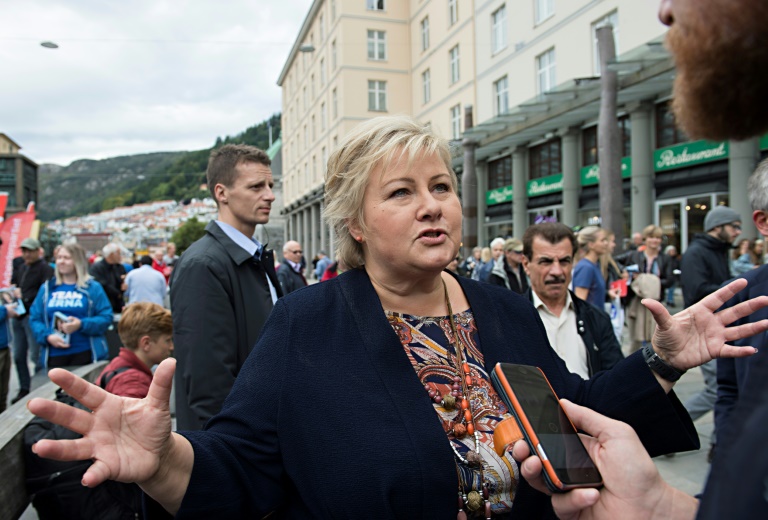
The narrow winner of Monday's general election, the 56-year-old leader is the first Conservative to win a second straight mandate in more than 30 years in oil-rich Norway. Solberg won by promising voters continuity.
For the past four years, she has headed a coalition with the anti-immigration Progress Party, successfully overcoming two major crises: the oil sector's slump caused by plunging crude prices since 2014, and the 2015 migrant crisis.
Norway proposes ban on full-face veils in schools
"Optimism has returned," she hammered throughout the campaign. "We want four more years of politics that work."
Norway's second female prime minister after Labour leader Gro Harlem Brundtland, the native of the west coast town of Bergen has spent her entire adult life in politics.
After lengthy political science and economics studies, Solberg was elected to parliament at 28, a position she has left only when she served in government. .She earned the nickname "Iron Erna" for the firm hand with which she managed immigration issues when she was minister of local government from 2001 to 2005.
That year, she came close to being kicked out as head of the party just one year into the job, after the Conservatives posted a catastrophic score in legislative elections. She then softened the party line, putting the accent on social issues. "People, not billions" became her leitmotif.
Politically close to German Chancellor Angela Merkel, Solberg has insisted she is not out to dismantle Norway's much-cherished welfare state, but rather reduce taxes and open up for more private actors in public services in a bid to improve efficiency.
Mixing knowledge of the issues with a laid-back style, she has managed to widen the Conservative voter base and make Norwegians want to vote for a party long seen as stuffy and old-fashioned.
Married and the mother of two children, she has let herself be photographed in everyday situations: jumping on a mini-trampoline, or at home in a messy kitchen with an ironing board unfolded in front of a cluttered cabinet stocked full of alcohol.
And it has paid off. In 2013, she came to power at the head of a minority coalition with the mildly populist Progress Party, a cumbersome but necessary ally which critics accuse her of not taming enough.
Norway's anti-oil Green Party could hold key to election outcome: DN poll
A survey conducted during the most recent election campaign showed that, in an unusual reversal of stereotypes, she is seen as much more "down to earth" and folksy -- a virtue in egalitarian Scandinavia -- than her Labour rival, the multi-millionnaire Jonas Gahr Store.
"The leader of the Conservative Party is considered by the majority of people as controlled, intelligent, close to the people and joyful. Actually, no other party leader is considered as being as close to the people," magazine Kampanje noted.
A fierce competitor, Solberg is also an avid gamer. She has been seen playing Pokemon Go during debates in parliament and on the streets of Bratislava in between official meetings.
Now, she'll have to get down to business to find allies to help her govern. But tricky negotiations lie ahead.
An ever-widening chasm separates the Progress Party and two other small centre-right parties, the Christian Democrats and the Liberals -- who appear less and less keen to support a government comprising the populists.



1732626034-0/BeFunky-collage-(92)1732626034-0-165x106.webp)


1732618327-2/Untitled-design-(7)1732618327-2-270x192.webp)










COMMENTS
Comments are moderated and generally will be posted if they are on-topic and not abusive.
For more information, please see our Comments FAQ